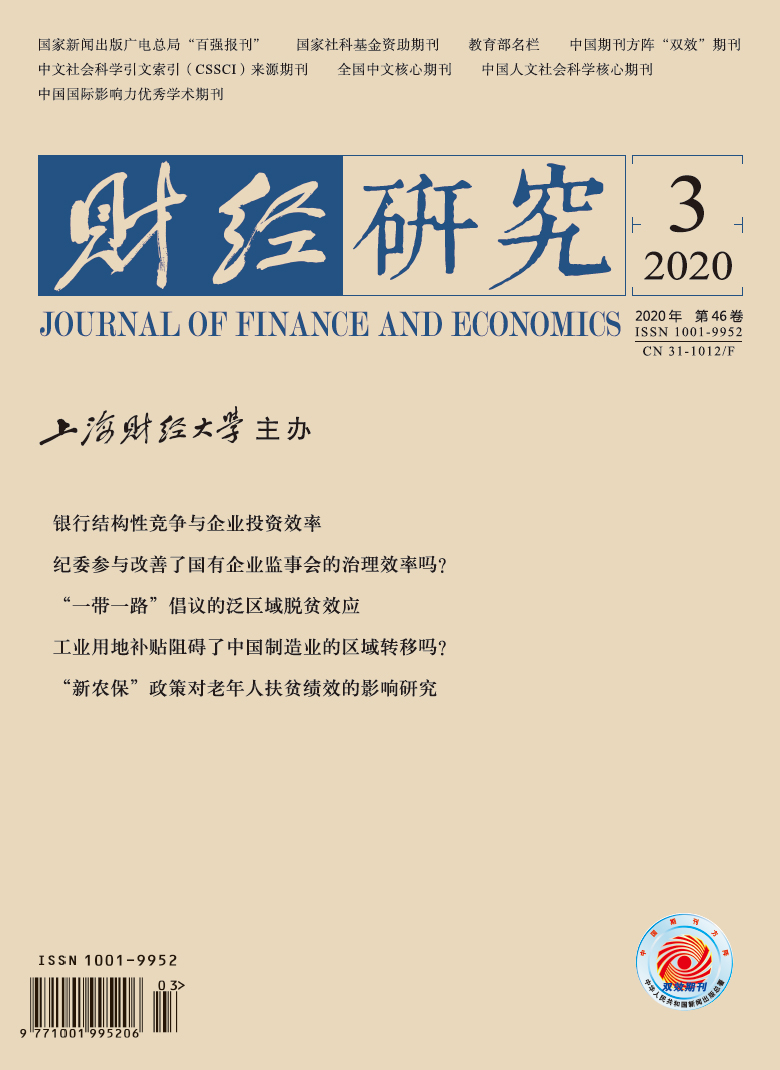文章基于2011年、2013年和2015年中国家庭金融调查(CHFS)三期面板数据,实证研究了风险态度对中国城乡家庭创业决策和创业强度的影响,并对影响创业规模的作用机制进行了识别和检验。研究发现:(1)家庭风险偏好越高越有利于家庭作出创业决策和经营决策,通过工具变量对潜在的内生性问题进行处理后,这种影响依然显著,并且该效应在城镇居住的农村户籍家庭中表现得更为明显;(2)偏好风险的家庭更能拓宽正式和非正式融资渠道,缓解融资约束,从而更有利于其作出家庭创业和经营决策;(3)偏好风险的家庭具有更高的人际信任水平,从而更有可能进行家庭创业或提升创业规模。文章为理解风险态度影响家庭创业行为选择和家庭创业强度的作用机制提供了新的经验证据,从而为中国经济在由高速增长阶段向高质量发展阶段的转型过程中如何更好地激励家庭创业、促进初创企业融资提供了政策参考。
风险态度对中国城乡家庭创业的影响分析——来自中国家庭金融调查3期面板数据的证据
摘要
参考文献
3 陈其进. 风险偏好对创业选择的异质性影响−基于RUMIC 2009数据的实证研究[J]. 人口与经济,2015,(2):78−86. DOI:10.3969/j.issn.1000-4149.2015.02.009
12 刘杰,郑风田. 流动性约束对农户创业选择行为的影响−基于晋、甘、浙三省894户农民家庭的调查[J]. 财贸研究,2011,(3):28−35,60. DOI:10.3969/j.issn.1001-6260.2011.03.004
15 翁辰,张兵. 信贷约束对中国农村家庭创业选择的影响−基于CHFS调查数据[J]. 经济科学,2015,(6):92−102. DOI:10.3969/j.issn.1002-2848.2015.06.011
16 吴开军. 大学生创业融资的困境及对策研究[J]. 技术经济与管理研究,2012,(8):25−28. DOI:10.3969/j.issn.1004-292X.2012.08.006
20 杨娜. 风险态度、自主创业与企业效益的关系基于CHFS的实证研究[J]. 商业经济研究,2015,(17):102−104. DOI:10.3969/j.issn.1002-5863.2015.17.042
22 张博,胡金焱,范辰辰. 社会网络、信息获取与家庭创业收入−基于中国城乡差异视角的实证研究[J]. 经济评论,2015,(2):52−67. DOI:10.3969/j.issn.2095-5073.2015.02.007
23 赵朋飞,王宏健,赵曦. 人力资本对城乡家庭创业的差异影响研究−基于CHFS调查数据的实证分析[J]. 人口与经济,2015,(3):89−97. DOI:10.3969/j.issn.1000-4149.2015.03.009
25 Ahn T. Attitudes toward risk and self-employment of young workers[J]. Labour Economics,2010,17(2): 434−442. DOI:10.1016/j.labeco.2009.06.005
26 Arrow K J, Lind R C. Uncertainty and the evaluation of public investment decisions[A]. Gopalakrishnan C. Classic papers in natural resource economics[C]. London: Palgrave Macmillan, 1974.
27 Burke A E,Fitzroy F R,Nolan M A. What makes a die-hard entrepreneur? Beyond the ‘employee or entrepreneur’ dichotomy[J]. Small Business Economics,2008,31(2): 93−115. DOI:10.1007/s11187-007-9086-6
28 Caliendo M,Fossen F M,Kritikos A S. Risk attitudes of nascent entrepreneurs-new evidence from an experimentallyvalidated survey[J]. Small Business Economics,2009,32(2): 153−167. DOI:10.1007/s11187-007-9078-6
29 Das T K,Teng B S. The risk-based view of trust:A conceptual framework[J]. Journal of Business and Psychology,2004,19(1): 85−116. DOI:10.1023/B:JOBU.0000040274.23551.1b
30 Delis M D,Mylonidis N. Trust,happiness,and households’ financial decisions[J]. Journal of Financial Stability,2015,20: 82−92. DOI:10.1016/j.jfs.2015.08.002
31 Ding Z J,Au K,Chiang F. Social trust and angel investors’ decisions:A multilevel analysis across nations[J]. Journal of Business Venturing,2015,30(2): 307−321. DOI:10.1016/j.jbusvent.2014.08.003
33 Donkers B,Melenberg B,Van Soest A. Estimating risk attitudes using lotteries:A large sample approach[J]. Journal of Risk and Uncertainty,2001,22(2): 165−195. DOI:10.1023/A:1011109625844
34 Gompers P A,Mukharlyamov V,Xuan Y H. The cost of friendship[J]. Journal of Financial Economics,2016,119(3): 626−644. DOI:10.1016/j.jfineco.2016.01.013
35 Graham J R,Harvey C R,Puri M. Managerial attitudes and corporate actions[J]. Journal of Financial Economics,2013,109(1): 103−121. DOI:10.1016/j.jfineco.2013.01.010
36 Hvide H K,Panos G A. Risk Tolerance and entrepreneurship[J]. Journal of Financial Economics,2014,111(1): 200−223. DOI:10.1016/j.jfineco.2013.06.001
37 Kaplan S N,Strömberg P. Financial contracting theory meets the real world:An empirical analysis of venture capital contracts[J]. The Review of Economic Studies,2003,70(2): 281−315. DOI:10.1111/1467-937X.00245
38 Kinnan C,Townsend R. Kinship and financial networks,formal financial access,and risk reduction[J]. The American Economic Review,2012,102(3): 289−293. DOI:10.1257/aer.102.3.289
39 Knight F H. Risk, uncertainty and profit[M]. Chicago: University of Chicago Press, 1921.
40 Li H Y,Li J. Top management team conflict and entrepreneurial strategy making in China[J]. Asia Pacific Journal of Management,2009,26(2): 263−283. DOI:10.1007/s10490-007-9071-2
41 Navarro-Carrillo G,Valor-Segura I,Moya M. Do you trust strangers,close acquaintances,and members of your ingroup? Differences in trust based on social class in Spain[J]. Social Indicators Research,2018,135(2): 585−597. DOI:10.1007/s11205-016-1527-7
42 Panousi V,Papanikolaou D. Investment,idiosyncratic risk,and ownership[J]. The Journal of Finance,2012,67(3): 1113−1148. DOI:10.1111/j.1540-6261.2012.01743.x
43 Parrino R,Poteshman A M,Weisbach M S. Measuring investment distortions when risk-averse managers decide whether to undertake risky projects[J]. Financial Management,2005,34(1): 21−60. DOI:10.1111/j.1755-053X.2005.tb00091.x
45 Shane S. Prior knowledge and the discovery of entrepreneurial opportunities[J]. Organization Science,2000,11(4): 448−469. DOI:10.1287/orsc.11.4.448.14602
46 Smith D A,Lohrke F T. Entrepreneurial network development:Trusting in the process[J]. Journal of Business Research,2008,61(4): 315−322. DOI:10.1016/j.jbusres.2007.06.018
47 Stafford C. Gifts,favors and banquets:The art of social relationships in China[J]. Journal of the Royal Anthropological Institute,1996,2(1): 200. DOI:10.2307/3034684
48 Stolle D,Nishikawa L. Trusting others-how parents shape the generalized trust of their children[J]. Comparative Sociology,2011,10(2): 281−314. DOI:10.1163/156913311X566599
49 Tian X,Wang T Y. Tolerance for failure and corporate innovation[J]. The Review of Financial Studies,2014,27(1): 211−255. DOI:10.1093/rfs/hhr130
50 TuckerIII I B. Entrepreneurs and public-sector employees:The role of achievement motivation and risk in occupational choice[J]. The Journal of Economic Education,1988,19(3): 259−268. DOI:10.1080/00220485.1988.10845270
引用本文
张云亮, 冯珺, 赵奇锋, 等. 风险态度对中国城乡家庭创业的影响分析——来自中国家庭金融调查3期面板数据的证据[J]. 财经研究, 2020, 46(3): 154-168.
导出参考文献,格式为:





 , 1
, 1 7062
7062  9202
9202

